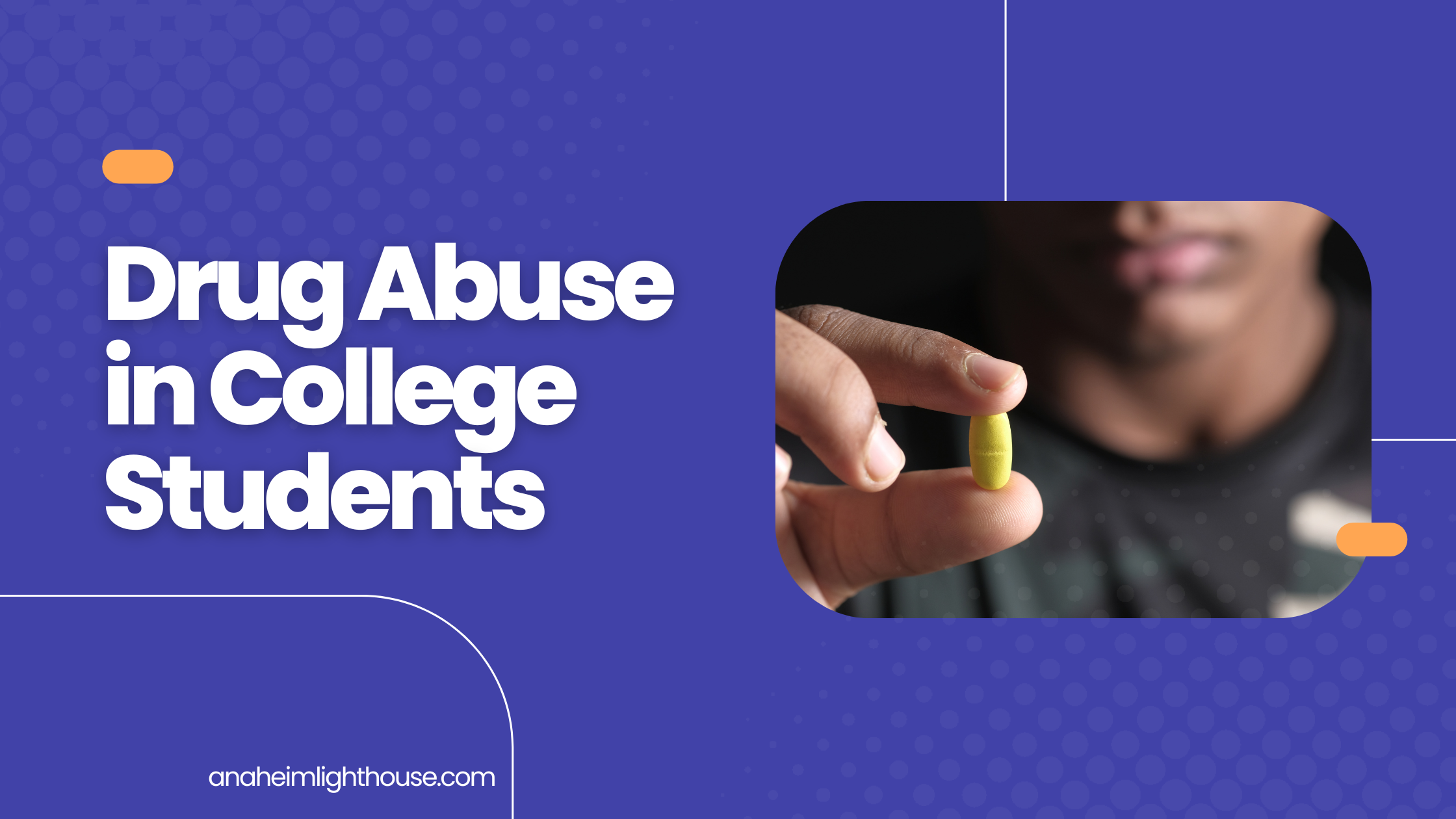Drug Abuse In College Students: Common Substances
The need to socialize, explore, and belong to a group are some of the topmost concerns of college students. Because of these concerns, many young adults start to engage in binge drinking alcohol and worse, abusing substances.
For parents and families concerned about their children, it’s important to be aware of the most common substances that college students abuse. In this article, we will talk about substance use disorder, some common drugs of abuse among college students and their effects on the user.

1. Marijuana Abuse in College Students
The abuse of marijuana or weed is highly rampant on college campuses, with around 12 percent as daily users. Marijuana abuse is becoming rampant especially as many states are now legalizing the recreational use of the substance.
Despite its legality, marijuana abuse can still lead to several problems. For one, it can interfere with a student’s ability to focus and stay motivated in school. Additionally, marijuana abuse has been linked to anxiety, depression, and even psychosis.
2. Adderall Abuse in College Students
Adderall, an ADHD medication, is one of the most abused drugs among universities and campuses. It is also called the study drug. On most campuses, around 24 percent of the general college student population uses Adderall.
Students turn to Adderall because it promises to help them focus and stay awake for long hours.
Adderall abuse, however, can lead to a whole host of problems such as anxiety, paranoia, high blood pressure, and even heart attacks. Additionally, Adderall addiction is very real and can be difficult to overcome.
3. Ritalin Abuse in College Students
Ritalin has a comparable effect with Adderall and is also considered a study drug. It helps students gain more focus and energy to stay up all night to study or make projects.
But just like Adderall abuse, Ritalin abuse can also lead to several health problems. Serious side effects of Ritalin include an increase in blood pressure and heart rate, as well as insomnia and loss of appetite.
While it can provide short-term effects that can benefit a student, the payback is not worth it in the long run. Addiction to stimulants can be very difficult to overcome.
4. Opioid Abuse in College Students
Generally, opioids are substances used to let a person feel a euphoric sensation that stimulates the reward system of the brain. With the opioid crisis still ongoing, it is no surprise that college students are also abusing these prescription drugs.
There are several ways that college students can access opioids. Some may be prescribed by a doctor for pain relief while others may get them from friends or illegal dealers. The alarming thing about college students sourcing opioids online or from illicit sources is that many of these opioid pills are fake.
Many fake opioids are mixed with other dangerous substances that can be lethal, such as fentanyl. Ingesting fake opioids can cause an overdose that may lead to death.
5. Ecstasy Abuse in College Students
Ecstasy or MDMA is a popular party drug that is commonly abused by college students. The primary effect of taking ecstasy is feeling a sense of euphoria or extreme happiness. It has become a popular drug among young adults because it makes them feel more confident and sociable, especially in party or club environments.
But what many don’t know is that ecstasy is also very dangerous. Some of the short-term effects of taking MDMA include anxiety, paranoia, and hallucinations. Ecstasy can also cause long-term damage to the brain, affecting a person’s mood and social behavior.
Based on medical studies, it has been found that students abusing Ecstasy also have a high propensity to abusing other substances which include the following:
- Heroin – 17% of the general student population
- LSD – 28% of the general student population
- Inhalants – 38% of the general student population
- Cocaine – 46% of the general student population
Triggers Pushing College Students to Abuse Substances
The triggers and risk factors influencing students to abuse drugs and alcohol can be grouped into two: internal and external factors. The latter factor has a greater influence on students to develop an addiction.
Here are some of the common factors triggering substance abuse in college students:
- Pressure and stress from studies and obligations
- Broken relationships with family and loved ones
- Being with schoolmates who are also engaged in drug abuse and alcohol drinking like fraternities and sororities
- Self-medication in cases where students suffer from substance abuse and mental health problems
Detrimental Impacts of Addiction Among College Students
Substance abuse not only ruins the lives of students but also their loved ones. It destroys families, friendships, and other social relationships. Moreover, addiction can also impact a student’s future prospects, both academically and professionally.
Here are some of the ways addiction can negatively affect college students:
- Decreased Academic Performance
Addiction can lead to lower grades and eventual academic failure. It can also make it difficult for a student to focus on their studies and complete assignments on time.
While drugs like Adderall or Ritalin may temporarily help a student focus on their work, the long-term effects are not worth it. These drugs are stimulants that can cause anxiety, irritability, and insomnia.
- Increased Risk of Injury
Many accidents happen every year due to students being under the influence of drugs or alcohol. These accidents can range from car accidents to falls and drowning.
In addition, students who are addicted to substances are also more likely to engage in risky behaviors that can lead to injury, such as driving while intoxicated or unprotected sex.
- Financial Instability
Addiction can cause financial problems for students in several ways. Firstly, it can lead to decreased productivity, which can impact a student’s ability to get a job or earn scholarships.
Secondly, addiction can also cause students to spend large amounts of money on drugs or alcohol, leading to debt and financial instability.
- Physical and Mental Health Problems
Substance abuse can lead to a variety of physical and mental health problems. These include liver damage, heart disease, cancer, and depression.
In addition, substance abuse can worsen existing mental health conditions or even lead to the development of new ones. Depression, anxiety, and post-traumatic stress disorder are all common among college students who abuse drugs or alcohol.
- Social Isolation
Addiction can lead to social isolation as it causes students to distance themselves from friends and family. It can also make it difficult for students to form new relationships.
- Disciplinary Problems
Students who are addicted to drugs and alcohol are more likely to get into fights, skip classes, and be involved in other disciplinary problems. This can lead to expulsion from college, which can impact a student’s future prospects.
- Legal Problems
Students who are addicted to substances are also more likely to get into legal trouble. This can include DUI charges, possession of drugs, or assault.
Treatment for Drug Abuse in College Students in Southern California
Many college students are often in denial or hiding their addiction. This makes it difficult for them to seek help. However, there are many treatment options available for college students struggling with addiction.
Some colleges have programs specifically designed to help students with substance abuse problems. These programs can provide counseling, group therapy, and access to support groups.
In addition, parents can help their children in looking for addiction treatment programs. If you know college students struggling with drug addiction, reach out to us today. We can help you find the treatment suitable for your needs.















